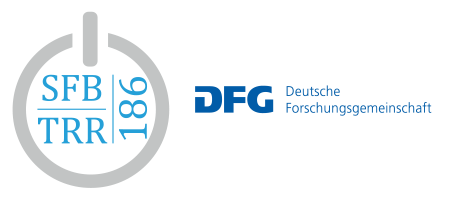
Prof. Dr. Michael Brunner

Biochemie-Zentrum der Universität Heidelberg (BZH)
Im Neuenheimer Feld 328
69120 Heidelberg
Phone: +49 (6221) 54 – 4207
E-mail: Michael.Brunner@bzh.uni-heidelberg.de
Biochemistry
Professor (W3)
2018 - Leopoldina membership
2012 - Heidelberg Molecular Life Science Award
2004 - EMBO membership
1990 - 1991 - EMBO fellowship
1989 - 1990 - DAAD fellowship
University training and degree
1984 - Diploma in Biology (“mit Auszeichnung”), University of Heidelberg
Advanced academic qualifications
1998 - Habilitation with Walter Neupert, Physiological Chemistry, LMU, Munich 1989 PhD “summa cum laude” with Hermann Bujard, University of Heidelberg
Postgraduate professional career
2008 - present - Full professor (W3) at Heidelberg University Biochemistry Center
2008 - Offer for full professorship at the University of Munich, declined
2000 - 2008 - Full professor (C4), at Heidelberg University Biochemistry Center
1999 - Offer for full professorship at the University of Innsbruck, declined
1998 - 2000 - Professor (C3, interim) LMU, Munich
1992 - 1998 - Group leader, Physiological Chemistry, LMU, Munich
1989 - 1991 - Postdoctoral fellow with Dr. J. E. Rothman, Princeton University and Sloan-Kettering Institute, New York
Coordinating Functions
2019 - present - Managing Director of the BZH
2011 - 2014 - Dean of Study of Bachelor Biochemistry Program
2010 - 2019 - Deep Sequencing Facility Steering Committee
2010 - 2013 - Managing Director of the BZH
2010 - 2012 - EMBO Young Investigator Selection Committee
2007 - 2019 - CellNetworks Steering Committee
2006 - 2010 - FEBS Advanced Course Committee
2003 - 2005 - Dean of the Faculty of Biosciences
Most important publications
- Oehler, M., Geisser, L., Diernfellner, A. C. R. & Brunner, M. Transcription activator WCC recruits deacetylase HDA3 to control transcription dynamics and bursting in Neurospora. Science Advances 9, eadh0721 (2023). https://doi.org/10.1126/sciadv.adh0721
- Marzoll, D., Serrano, F. E., Shostak, A., Schunke, C., Diernfellner, A. C. R. & Brunner, M. Casein kinase 1 and disordered clock proteins form functionally equivalent, phospho-based circadian modules in fungi and mammals. Proceedings of the National Academy of Sciences 119, e2118286119 (2022). https://doi.org/10.1073/pnas.2118286119
- Diernfellner, A. C. R., Lauinger, L., Shostak, A. & Brunner, M. A pathway linking translation stress to checkpoint kinase 2 signaling in Neurospora crassa. Proceedings of the National Academy of Sciences 116, 17271-17279 (2019). https://doi.org/10.1073/pnas.1815396116
- Cesbron, F., Oehler, M., Ha, N., Sancar, G. & Brunner, M. Transcriptional refractoriness is dependent on core promoter architecture. Nature Communications 6, 6753 (2015). https://doi.org/10.1038/ncomms7753
- Lauinger, L., Diernfellner, A., Falk, S. & Brunner, M. The RNA helicase FRH is an ATP-dependent regulator of CK1a in the circadian clock of Neurospora crassa. Nature Communications 5, 3598 (2014). https://doi.org/10.1038/ncomms4598
- Shostak, A., Ruppert, B., Ha, N., Bruns, P., Toprak, U. H., Lawerenz, C., Lichter, P., Radlwimmer, B., Eils, J., Brors, B., Radomski, S., Scholz, I., Richter, G., Siebert, R., Wagner, S., Haake, A., Richter, J., Aukema, S., Ammerpohl, O., Lopez, C., Nagel, I., Vater, I., Wagner, R., Borst, C., Haas, S., Rohde, M., Burkhardt, B., Lisfeld, J., Claviez, A., Dreyling, M., Eberth, S., Trümper, L., Kube, D., Stadler, C., Einsele, H., Frickhofen, N., Hansmann, M.-L., Karsch, D., Kneba, M., Mantovani-Löffler, L., Staib, P., Stilgenbauer, S., Ott, G., Küppers, R., Weniger, M., Hummel, M., Lenze, D., Szczepanowski, M., Klapper, W., Kostezka, U., Möller, P., Rosenwald, A., Leich, E., Pischimariov, J., Binder, V., Borkhardt, A., Hezaveh, K., Hoell, J., Rosenstiel, P., Schilhabel, M., Schreiber, S., Bernhart, S. H., Doose, G., Hoffmann, S., Kretzmer, H., Langenberger, D., Binder, H., Hopp, L., Kreuz, M., Loeffler, M., Rosolowski, M., Korbel, J., Sungalee, S., Stadler, P. F., Zenz, T., Eils, R., Schlesner, M., Diernfellner, A., Brunner, M. & Project, I. M.-S. MYC/MIZ1-dependent gene repression inversely coordinates the circadian clock with cell cycle and proliferation. Nature Communications 7, 11807 (2016).https://doi.org/10.1038/ncomms11807
- Querfurth, C., Diernfellner, Axel C. R., Gin, E., Malzahn, E., Höfer, T. & Brunner, M. Circadian Conformational Change of the Neurospora Clock Protein FREQUENCY Triggered by Clustered Hyperphosphorylation of a Basic Domain. Molecular Cell 43, 713-722 (2011). https://doi.org/10.1016/j.molcel.2011.06.033
- Sancar, G., Sancar, C., Brügger, B., Ha, N., Sachsenheimer, T., Gin, E., Wdowik, S., Lohmann, I., Wieland, F., Höfer, T., Diernfellner, A. & Brunner, M. A Global Circadian Repressor Controls Antiphasic Expression of Metabolic Genes in Neurospora. Molecular Cell 44, 687-697 (2011). https://doi.org/10.1016/j.molcel.2011.10.019
- Malzahn, E., Ciprianidis, S., Káldi, K., Schafmeier, T. & Brunner, M. Photoadaptation in Neurospora by Competitive Interaction of Activating and Inhibitory LOV Domains. Cell 142, 762-772 (2010). https://doi.org/10.1016/j.cell.2010.08.010
- Schafmeier, T., Haase, A., Káldi, K., Scholz, J., Fuchs, M. & Brunner, M. Transcriptional Feedback of Neurospora Circadian Clock Gene by Phosphorylation-Dependent Inactivation of Its Transcription Factor. Cell 122, 235-246 (2005). https://doi.org/10.1016/j.cell.2005.05.032
